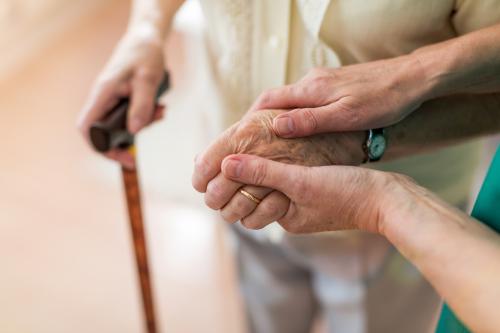If you want more content like this, subscribe to our newsletter.
This week in Class Notes:
- High-speed internet worsens adolescent mental health, especially for girls.
- Incentive pay programs help reduce substitute teacher shortages.
- SNAP benefits matter for SAT performance.
- There are now more than 1 million same-sex households, as this week’s top chart shows.
- Ditch the cell phone bans in schools, argues Michael B. Horan in this month’s op-ed.
- Check out our piece on immigrants and the elder care market.
- For your calendar: events on school finance, equitable community development, and broadband access.
High-speed internet worsens adolescent mental health, especially for girls
Does internet access impact mental health and behavior in teens and young adults? Esther Arenas-Arroyo and co-authors examine this question using the introduction of high-speed internet (HSI) in different areas of Spain between 2007 and 2019. The rollout of fiberoptic internet in the country was influenced by a range of historical and political factors more than socioeconomic ones, providing exogenous variation for the study. Using administrative data on discharge diagnoses from Spain’s public and private hospitals, the authors find that HSI increased behavioral and mental health problems among 15–19-year-olds, with girls driving much of the effect. In particular, HSI led to more anxiety, mood disorders, drug abuse, self-harm, and suicide attempts. Drawing on separate data from ESTUDES, a survey of 14–18-year-old Spanish teens, the researchers also found that access to HSI appears to “crowd out” time for sleep, homework, and socialization. This paper adds to a growing literature on the effects of internet and social media usage, examining a time period that saw the introduction of popular platforms including Instagram (2012) and TikTok (2017).
Incentive pay programs help reduce substitute teacher shortages
Even before COVID-19, there was a shortage of substitute teachers for K-12 schools. This has equity implications. In Chicago Public Schools (CPS), Black students are three times more likely to experience an uncovered teacher absence than white students, and low-income students at twice the rate as more affluent students. Can financial incentives help? Matthew A. Kraft and co-authors evaluate a 2018 CPS program which offered bonuses to substitute teachers working in schools with the lowest fill rates. Using a regression discontinuity design, they find that the bonuses resulted in a 23-percentage point increase in the number of substitute requests filled in the 75 target schools. The effects were mostly concentrated among female teachers, Black and Hispanic teachers, and among substitute teachers who had previously worked at the schools. Teacher absences also increased by 3.5 days, though largely for professional development instead of sick or personal days.
SNAP benefits matter for SAT performance
Can access to the Supplemental Nutrition Assistance Program (SNAP) improve academic performance? Timothy N. Bond and co-authors examine whether the timing of SNAP payments impacts SAT scores. Some states issue SNAP benefits to program participants on a single day, others stagger the payments across the month, for example in last name order. Bond et al. exploit the variation in timing in seven states and Washington D.C. to compare SAT outcomes for students. They find that students taking the SAT in the second half of the month after a SNAP payment scored six points lower than those during who took the test during the first two weeks. They were also less likely to attend a four-year college. Those that did attend college were less likely to attend a more selective school.
Top chart: Number of same-sex households exceeded 1 million in 2021
Using the American Community Survey, the Census Bureau released updated numbers for same-sex couple households in the U.S. There were about 1.2 million in 2021, with roughly 710,000 married and 500,000 unmarried. Larger shares of same-sex couples had both partners with at least a bachelor’s degree compared to opposite-sex households. A larger share of same-sex couples are also interracial compared to opposite-sex couples.

Choice opinion: Ban the cellphone ban
“[C]ellphone bans are following the larger trend of banning many things in schools—from books to speakers to certain kinds of speech or topics of debate. Cellphones may make for another easy bogeyman, but blanket bans are ill-informed and regressive. Though we might not see a big reversal in phone bans anytime soon, we should. Educators on the ground should choose for themselves when and whether to allow their students to carry cellphones to class, so they can leverage learning apps to help students make progress,” writes Michael B. Horn in Education Next.
Self-promotion: Immigrants play an important role in supporting the elder-care market
As the U.S. population ages, the need for better elder care provision is rising, especially since most of the elderly population prefers to age at home. In this paper, Kristin F. Butcher, Kelsey Moran, and Tara Watson look at how immigrant labor is an important part in allowing for the elderly to age at home. They find that a larger less-educated immigrant labor force is associated with a 1.5 percentage point lower probability in institutionalization for those aged 65 or older and a 3.8 percentage point lower probability for those 80 and older.
For your calendar: events on broadband access, school finance, and equitable community development
The state of broadband at IIJA’s one-year anniversary
The Brookings Institution
Thursday, December 15, 2022 2:00 PM – 3:00 PM EST
School finance and education equity
The Brookings Institution
Friday, December 16, 2022 1:30 PM – 2:30 PM EST
Advancing racial equity in our communities: Involving communities in equitable development
Urban Institute
Friday, December 16, 2022 12:00 PM – 1:00 PM EST
The Brookings Institution is committed to quality, independence, and impact.
We are supported by a diverse array of funders. In line with our values and policies, each Brookings publication represents the sole views of its author(s).







Commentary
Class Notes: Adolescent mental health, substitute teacher shortages, and more
December 14, 2022